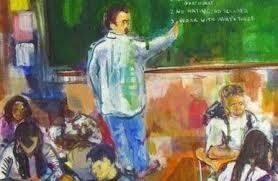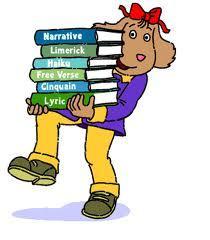Learn How to Write Poetry
 published in Blogging Authors
published in Blogging AuthorsYou don't have to sit through hours of poetry workshops to learn how to write poetry. Get published by numerous magazines and online publications throughout the web without taking a course in poetry. The truth is you are your best teacher and if you're committed, it’s possible to learn to write poetry by applying these simple steps.
Make time to write
Start by jotting done words, phrases, habits, things of interest, your likes, and dislikes ... do this daily. It could be on any topic such as dreams, goals, sports, music, routines, etc. It is easier to write on a subject you're familiar with and one that inspires you. In any case, write what you know. The length of your poem, spelling and grammar mistakes aren't as important when you first start writing. Just write. Overtime this exercise will help structure your ideas, while at the same time increase your writing comfort. The more you write, the further your progress will be. It is essential you devote time to your writing and set aside a few hours to write each day. A closer scrutiny should be given to spelling/grammar errors as you acquire more writing experience.
Join a poetry forum - a site for amateurs to post their work and get instance feedback. Having readers comment on your work provides an incentive to write and a format that encourages you to improve. There are many sites online where beginners can submit their poetry. Here are a few:
(You can find a complete listing by searching under poetry forum.)
Everypoet.com
Netpoets.com
Writerswrite.com
poetrypoems.com
You don't have to sit through hours of poetry workshops to learn how to write poetry. Get published by numerous magazines and online publications throughout the web without taking a course in poetry. The truth is you are your best teacher and if you're committed, it’s possible to learn to write poetry by applying these simple steps.

Rewriting your poems
Once you have accumulated some work, the focus should then be on rewriting or revising your poem. A poem is not necessarily finished after you've written it. Don't be afraid to rewrite a poem six months, or a year after it’s written. How to do this? Pay close attention to grammar usage, check thoroughly for spelling mistakes or errors, and make sure you are using the right punctuation. Use grammar handbooks to help you with grammar if it is something you struggle with. Also, use a thesaurus to eliminate overused words.
For example: Use a thesaurus to avoid cliché words. A thesaurus gives you the ability to replace a commonly used word like “shine,” and substitute it with a word less frequently used like “luster” instead.
When revising, the goal is to be concise. Get rid of redundancies (that, had, would, could ...) are oftentimes not needed. Try using fewer words to illustrate a thought without disrupting the poem’s flow. Practice reading your poems aloud. Read in front of family or friends. Hearing your poem read aloud makes it easier to catch mistakes our eyes can sometimes overlook. Try it! Writing for fun is one thing, but, if you want to become a published poet you must keep this in mind.
Be descriptive
Describe, describe, describe. Show and not tell the reader what you are conveying. Become more playful and creative with language as you develop further in your writing process. Be descriptive. Have readers picture your thoughts as you express them. Avoid using vague generalization. For instance, instead of writing “she could not move around,” write “her limbs grew numb.” Here’s another example, instead of writing “she was quite scared,” write “her knees trembled.” In both illustrations used above, one tells of an emotion and the other displays an emotion. Use specific and concise words to allow the reader to visualize your thoughts.
Reading is required
You like to write and that's a good thing, however, reading is just as important in learning to write poetry. To improve your writing you must read! Many writers of poetry don't spend time reading the craft they love and often don't get published. To further advance your writing skills you must read not just your work, but also poems and poetry books from established poets. Furthermore, read books by poets you admire.
Reading poetry helps you to absorb the language, use of metaphors, imagery... If you are not familiar with the meaning of the words metaphor or imagery, be sure to understand their usage in order to apply their principles into your poetry. Otherwise how will you write what you don't understand? Reading is also a vital part of the writing process and it will provide you with an honest review of your own work.
These are essential principles to writing poetry. You won't become a poet overnight; but, with time, patience, and effort your technique will gradually improve. Once you've compiled a number of poems, it won't be long before your writings are published!
Useful Resources
www.thesaurus.reference.com
www.Yourdictionary.com
http://grammar.ccc.commnet.edu/grammar/
date newest »
newest »
 newest »
newest »





1. There are plenty of quite good books around on both understanding and writing poetry. Use these, or not use them to suit yourself. Just as a good teacher might not suit everyone, a good book might not either. It is less embarrassing, however, to turn one's back on one book and select another, than to reject a teacher.
2. Be prepared to involve yourself in the critical process of poetry fora. Above all, be prepared to have your work pulled apart as well as have (or parts or aspects of it) endorsed by others. And be prepared to offer similar effort and goodwill in your comments on others' works.
3. Try using a number of different poetic forms to find and establish your own voice or voices. For myself, I have written in a variety of verse forms. But also be prepared if it does not seem to spark, to pull your lines apart and recast them into a different form, or even free verse.